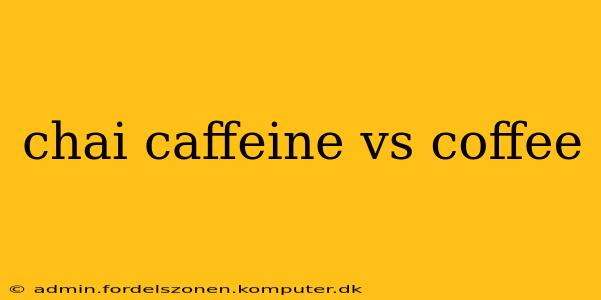For many, the morning ritual revolves around a caffeine kickstart. But while coffee reigns supreme for many, chai tea offers a compelling alternative. This detailed comparison dives into the caffeine content, flavor profiles, and health benefits of both beverages, helping you decide which brew best suits your needs.
How Much Caffeine is in Chai Tea vs. Coffee?
This is a crucial question, and the answer isn't straightforward. The caffeine content in both chai and coffee varies significantly depending on several factors.
Coffee: The caffeine in coffee depends heavily on the bean type, roast level, brewing method, and the amount of coffee used. A typical 8-ounce cup of brewed coffee can contain anywhere from 80 to 175 milligrams (mg) of caffeine. Espresso tends to have a higher concentration.
Chai Tea: The caffeine in chai depends primarily on the type and amount of black tea used in the blend. Chai typically uses black tea as its base, which naturally contains caffeine. However, the addition of milk, spices, and sweeteners can dilute the overall caffeine concentration. A standard 8-ounce cup of chai tea usually contains between 25 to 50 mg of caffeine—significantly less than coffee. Note that chai made with herbal teas instead of black tea will contain little to no caffeine.
What's the difference in caffeine content between black tea and chai tea?
The caffeine content difference between black tea and chai comes down to dilution and the tea-to-water ratio. While black tea itself has a caffeine concentration similar to chai, making chai involves adding milk, spices, and other ingredients, effectively reducing the concentration of caffeine per ounce.
Chai Tea vs Coffee: Flavor Profiles
This is largely a matter of personal preference, but understanding the core flavor differences is helpful.
Coffee: Offers a wide range of flavors, from bold and bitter to subtly sweet and fruity, depending on the bean origin, roast, and brewing method. It often exhibits notes of chocolate, nuts, or caramel.
Chai Tea: Possesses a warm, spicy flavor profile. The blend of black tea with spices like cinnamon, cardamom, ginger, and cloves creates a uniquely aromatic and comforting taste. Milk and sweetener are often added, further softening the intensity and adding a creamy texture.
Health Benefits: Chai vs. Coffee
Both beverages offer potential health benefits, although the research is ongoing and varies depending on factors such as quantity consumed and individual health conditions.
Coffee: Studies suggest coffee consumption may be linked to a reduced risk of type 2 diabetes, Parkinson's disease, and certain types of cancer. However, excessive consumption can lead to anxiety, insomnia, and digestive issues. Coffee is also a good source of antioxidants.
Chai Tea: Similarly, chai tea offers potential health benefits due to the antioxidants present in black tea and the anti-inflammatory properties of the spices it contains. These spices may help with digestion and reduce inflammation. However, high sugar content from added sweeteners can negate these benefits.
Which Drink Is Right For You?
The "better" choice ultimately depends on your individual preferences and needs. Consider these factors:
- Caffeine sensitivity: If you are sensitive to caffeine, chai tea’s lower caffeine content may be a better option.
- Flavor preferences: Do you prefer the bold, sometimes bitter taste of coffee, or the warm, spicy profile of chai?
- Health goals: While both offer potential health benefits, consider your dietary needs and any potential interactions with medications or health conditions.
By understanding the caffeine content, flavor profiles, and health benefits of both chai tea and coffee, you can make an informed decision about which beverage best fits your lifestyle and preferences. Remember moderation is key with both beverages.
